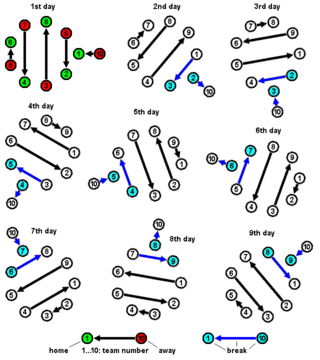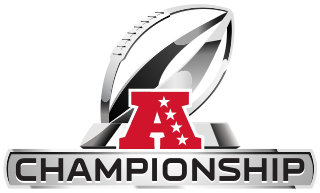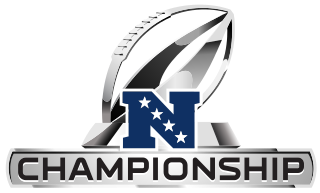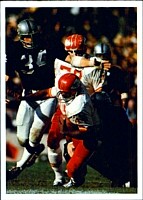The playoffs, play-offs, postseason or finals of a sports league are a competition played after the regular season by the top competitors to determine the league champion or a similar accolade. Depending on the league, the playoffs may be either a single game, a series of games, or a tournament, and may use a single-elimination system or one of several other different playoff formats. Playoff, in regard to international fixtures, is to qualify or progress to the next round of a competition or tournament.
A tournament is a competition involving at least three competitors, all participating in a sport or game. More specifically, the term may be used in either of two overlapping senses:
- One or more competitions held at a single venue and concentrated into a relatively short time interval.
- A competition involving a number of matches, each involving a subset of the competitors, with the overall tournament winner determined based on the combined results of these individual matches. These are common in those sports and games where each match must involve a small number of competitors: often precisely two, as in most team sports, racket sports and combat sports, many card games and board games, and many forms of competitive debating. Such tournaments allow large numbers to compete against each other in spite of the restriction on numbers in a single match.

The National Football League All-Star Game (1939–1942), Pro Bowl (1951–2022), or Pro Bowl Games is an annual event held by the National Football League (NFL) featuring the league's star players.
In a sport or game, sudden death is a form of competition where play ends as soon as one competitor is ahead of the others, with that competitor becoming the winner. Sudden death is typically used as a tiebreaker when a contest is tied at the end of regulation (normal) playing time or the completion of the normal playing task.
Throughout its history, the National Football League (NFL) and other rival American football leagues have used several different formats to determine their league champions, including a period of inter-league matchups to determine a true national champion.
A bracket or tournament bracket is a tree diagram that represents the series of games played during a knockout tournament. Different knockout tournament formats have different brackets; the simplest and most common is that of the single-elimination tournament. The name "bracket" is American English, derived from the resemblance of the links in the tree diagram to the bracket punctuation symbol ] or [. The closest British term is draw, although this implies an element of chance, whereas some brackets are determined entirely by seeding.
In an organized sports league, a typical season is the portion of one year in which regulated games of the sport are in session: for example, in Major League Baseball the season lasts approximately from the last week of March to the last week of September. In other team sports, like association football or basketball, it is generally from August or September to May although in some countries – such as Northern Europe or East Asia – the season starts in the spring and finishes in autumn, mainly due to weather conditions encountered during the winter.
A single-elimination, knockout, or sudden-death tournament, is a type of elimination tournament where the loser of each match-up is immediately eliminated from the tournament. Each winner will play another in the next round, until the final match-up, whose winner becomes the tournament champion. Each match-up may be a single match or several, for example two-legged ties in European sports or best-of series in North American pro sports. Defeated competitors may play no further part after losing, or may participate in "consolation" or "classification" matches against other losers to determine the lower final rankings; for example, a third place playoff between losing semi-finalists. In a shootout poker tournament, there are more than two players competing at each table, and sometimes more than one progresses to the next round. Some competitions are held with a pure single-elimination tournament system. Others have many phases, with the last being a single-elimination final stage, often called playoffs.

A round-robin tournament or all-play-all tournament is a competition format in which each contestant meets every other participant, usually in turn. A round-robin contrasts with an elimination tournament, wherein participants are eliminated after a certain number of wins or losses.

The AFC Championship Game is the annual championship game of the American Football Conference (AFC) and one of the two semifinal playoff games of the National Football League (NFL), the largest professional American football league in the world. The game is played on the last Sunday in January by the two remaining playoff teams, following the AFC postseason's first two rounds. The AFC champion then advances to face the winner of the NFC Championship Game in the Super Bowl.

The National Football League (NFL) playoffs are the games that make up the single-elimination tournament held after the regular season to determine the league champion. Currently, seven teams from each of the league's two conferences qualify for the playoffs. A tie-breaking procedure exists if required. The tournament culminates in the Super Bowl: the league's championship game in which two teams, one from each conference, play each other to become champion of the NFL.

The NFC Championship Game is the annual championship game of the National Football Conference (NFC) and one of the two semifinal playoff games of the National Football League (NFL), the largest professional American football league in the world. The game is played on the last Sunday in January by the two remaining playoff teams, following the NFC postseason's first two rounds. The NFC champion then advances to face the winner of the AFC Championship Game in the Super Bowl.
The American Football Conference – Western Division or AFC West is one of the four divisions of the American Football Conference (AFC) in the National Football League (NFL). The division comprises the Denver Broncos, Kansas City Chiefs, Las Vegas Raiders, and Los Angeles Chargers.
An athletic conference is a collection of sports teams, playing competitively against each other in a sports league. In many cases conferences are subdivided into smaller divisions, with the best teams competing at successively higher levels. Conferences often, but not always, include teams from a common geographic region.
There are a number of formats used in various levels of competition in sports and games to determine an overall champion. Some of the most common are the single elimination, the best-of- series, the total points series more commonly known as on aggregate, and the round-robin tournament.
A wild card is a tournament or playoff berth awarded to an individual or team that fails to qualify in the normal way; for example, by having a high ranking or winning a qualifying stage. In some events, wildcards are chosen freely by the organizers. Other events have fixed rules. Some North American professional sports leagues compare the records of teams which did not qualify directly by winning a division or conference.
In sports, a two-legged tie is a contest between two teams which comprises two matches or "legs", with each team as the home team in one leg. The winning team is usually determined by aggregate score, the sum of the scores of the two legs. For example, if the scores of the two legs are:
Many sports playoffs and knockout tournaments include a third place playoff, third place match, bronze medal game, or consolation game to decide which competitor or team will be credited with finishing third and fourth. This game is typically competed by the competitors or teams that lost in the semi-finals of the tournament that they competed in. Some tournaments may use the third place playoff to determine who wins the bronze medal, while other tournaments need to hold a third place playoff for seeding purposes if three or all four semi-finalists advance to another tournament. Social psychology studies have found that bronze medalists who had won a third place playoff were significantly happier than silver medalists who had lost a championship final.

The 1969 AFL season was the tenth and final regular season of the American Football League. To honor the AFL's tenth season, a special anniversary logo was designed and each Kansas City Chiefs player wore a patch on his jersey with the logo during Super Bowl IV, the final AFL-NFL World Championship Game prior to the AFL–NFL merger.
As with all sports leagues, there are several significant rivalries between teams and notable players in the National Football League (NFL). Rivalries are occasionally created due to a particular event that causes bad blood between teams, players, coaches, or owners, but for the most part, they arise simply due to the frequency with which some teams play each other and sometimes exist for geographic reasons.





